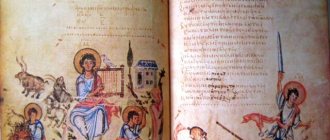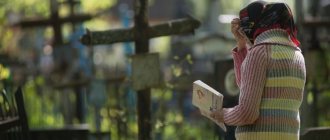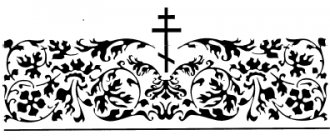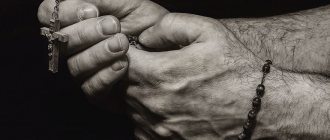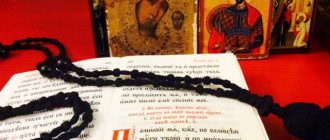RECOMMENDED FOR PUBLICATION BY THE PUBLISHING COUNCIL OF THE RUSSIAN ORTHODOX CHURCH
IS R 17-711-3246
“It is BETTER FOR THE SUN TO STOP THAN TO STOP READING THE PSALMTER,” say the holy fathers of the Church. Our ancestors, the Orthodox Russian people, always understood this, and the Psalter accompanied a person throughout his entire life - from birth to the grave. The Psalter was the first book from which literacy was taught, the psalms of David were read in moments of danger, asking for God’s intercession and help, and with the words of the psalms they offered praise and thanksgiving to God. When a person died, they again turned to this holy book.
The Psalter has just as great significance for us. Usually, its reading is associated with prayer for the departed, when, if possible, one tries to read the entire Psalter or at least several kathismas over the body of the deceased. At each “Glory”, into which kathisma is divided, the deceased are remembered, especially the newly departed, and it is asked that the Lord accept our prayer, our repentance for them and forgive the sins of the deceased. This prayer brings undoubted benefits. It is no coincidence that in monasteries there is a custom of “unsleepless” reading of the Psalter, when day and night psalm words are tirelessly ascended to God, and the soul of a deceased person through these prayers receives forgiveness from God.
The soul of the deceased is like a helpless baby who is waiting for our prayerful help. First of all, it is necessary, of course, to remember at the proskomedia, and then to pray on the Psalter. There is much evidence that prayer for the dead brings great results. It was revealed by God to the Monk Macarius of Egypt that when Christians pray for their departed, even the most desperate sinners condemned to torment receive relief.
The deceased are waiting for our prayers. The holy elder Jacob of Ephboe said that when he once forgot to remember his dead mother at the proskomedia, she appeared to him and reproached him for this. “Why, I remember you every day.” - “No, today you didn’t remember me, because I didn’t receive consolation, I didn’t receive joy.”
Prayer for the dead benefits not only those who have left us, it is just as necessary for the living. “My prayer will return to my bosom,” says the Holy Scripture. And people still living on earth, in their grief and sadness, in the confusion of their souls, reading the psalm words, find hope and peace.
A man once came to the Monk Ambrose of Optina and said that his soul was troubled.
The elder advised him to read the Psalter. After some time, he writes: “I’m reading - I don’t understand anything,” to which the elder replied: “You don’t understand, but the demons understand and tremble.”
We pray because we trust in God's mercy. The Church teaches that on the fortieth day after death a person is given only a preliminary verdict, until the Last Judgment. And we must not abandon prayers for the departed; we must constantly call on God’s mercy on them, adding our private prayers, prayers on the Psalter, to church commemoration.
Archimandrite ALEXIY (Polikarpov), abbot of the Danilov Monastery
On the commemoration of the dead according to the statutes of the Orthodox Church
Preparing for demise
The Orthodox Church guides each of its members to the afterlife with the Sacraments of Confession and Holy Communion. In case of mortal danger, first of all, care should be taken to invite a priest to the sick person to perform these Sacraments, so as not to appear before God unprepared and uncleaned. During serious illnesses, the Holy Church calls on her children to also resort to the Sacrament of Anointing, in which, when anointing the body with oil, the grace of God is invoked on the sick person, healing from illnesses and remission of sins is asked. Therefore, this Sacrament must be performed during the intensification of the illness, with the faith that the days of a person’s earthly life will be extended for repentance and correction.
When the soul is separated from the body and moves into the spiritual world, it especially needs our prayerful help. To facilitate the very last minutes of a Christian’s earthly life, special canons are read on the exodus of the soul from the body: to the Lord our God Jesus Christ and the Most Pure Mother of God and the canon “when a person suffers for a long time.” The canons are filled with great repentance and prayers for God’s mercy to those departing to another world. In the absence of a priest, both canons on the outcome of the soul can and should be read at the bedside of a dying person by a layman. In our publication, according to the instructions of St. Athanasius (Sakharov), they are combined into one Follow-up for the separation of the soul from the body of every true believer
(see:
Afanasy Sakharov
, bishop. On the commemoration of the departed according to the charter of the Orthodox Church. - St. Petersburg: Satis, 1999. P. 137).
The canons on the outcome of the soul do not have to be read directly next to the dying person. If a person dies in a hospital, the canons can be read at home. The main thing is to help the soul in these most difficult moments for it. If a Christian gives up the ghost while reading the canons, then they are finished reading with the funeral refrain: “Rest, O Lord, to the soul of Thy departed servant...”. And after the 9th song they end with the End of the funeral canons.
Upon the departure of the soul from the body, they begin to read the Canon about the deceased
(p. 361). If a person died not at home, read the canon upon receiving news of his death.
Funeral reading of the Psalter
Reading the Psalter can begin immediately after death and not necessarily directly above the coffin. The custom of singing psalms at the tomb of the deceased came from deep early Christian antiquity. This is both the strongest help from the living to the soul of the deceased, who is going through terrible ordeals in the first days, and consolation for grieving loved ones.
Reading the Psalter before burial differs from reading it later during home prayer. It is performed according to a special rite, it is advisable not to interrupt it either day or night. It is necessary to read the entire Psalter over the tomb at least once. At the same time, only the newly deceased are commemorated; other deceased should not be commemorated.
Prayers for the departed on Bright Week
If a person died on Bright Week (from the day of Holy Easter to Saturday of Bright Week inclusive), then instead of the funeral service the Easter Canon
. In all cases when the Litia is supposed to be read, the Easter stichera are sung: “May God rise ...” and “Holy Easter ...”, that is, at the position in the coffin, at the removal of the body from the house and before and after burial in the cemetery.
Instead of the Psalter on Bright Week, according to tradition, the Acts of the Holy Apostles are read. They begin the reading with the words: “Through the prayers of the holy Apostle and Evangelist Luke, Lord Jesus Christ, the Son of God, have mercy on us, Amen,” after reading: “To our God be glory always, now and ever, and unto ages of ages, Amen.”
Reading the Acts of the Holy Apostles contains both prayer for the deceased and consolation to relatives. The pagans have a custom of mourning, hysterical sobs and screams, tearing their clothes. We, Christians, believe that life does not end with death, that the death of the body is not the death of the soul, that the soul is immortal. Therefore, we must accompany the soul of the one who has left us in quiet prayer.
Burial
During burial, the coffin with the body of the deceased is taken out of the house, transferred to the temple and from the temple to the grave while the “Trisagion” is chanted. On Bright Week, the deceased is seen off to the singing of “Christ is risen from the dead...”. A cross or icon is carried in front. In some villages, the custom of a funeral procession with a cross and banners is still preserved. An orchestra is inappropriate at the funeral of Orthodox Christians.
Days of Remembrance of the Dead
The first forty days after death are dedicated to intense prayers for the deceased; all these days he is referred to in prayers as the newly deceased. A special commemoration is made on the third day - in remembrance that our Lord Jesus Christ rose from the dead “on the third day according to Scripture.” On the ninth day, we pray that through the intercession and prayers of the nine angelic orders, the soul of the deceased will be pardoned. And on the fortieth day - in memory of the fact that our Lord Jesus Christ ascended to Heaven on the fortieth day after His Resurrection. There is also a pious custom to perform a special commemoration on the twentieth day after death and six months later.
The main days of remembrance of the deceased are anniversaries of death, as well as namesake days. Commemoration is also obligatory on Ecumenical Parental Saturdays: Meat (the week before Lent), Trinity (before the Holy Trinity Day), as well as on Parental Saturdays of the 2nd, 3rd and 4th weeks of Lent, on Radonitsa and Dimitrievskaya Saturday. On Ecumenical Parental Saturdays, the Church especially prays for those who died a sudden death, for those pious Christians who, having passed into another world in a foreign land, from hunger and disease, at sea, in a fire, from troubles and misfortunes, “did not receive the legalized psalms and songs of memory " Radonitsa is the first commemoration of the dead after Holy Easter, on the 10th day, Tuesday of St. Thomas Week. Dimitrievskaya Saturday was established by the holy noble prince Dimitri Donskoy in memory of the soldiers who fell on the Kulikovo field. Subsequently, all Orthodox Christians began to be commemorated on this day.
In addition, all Saturdays of the year on which holidays do not fall are dedicated to the remembrance of the dead, because Saturday is a day of rest, “the seventh day... which the Lord blessed of old... rest from work” (Gen. 2:3). And because our Lord Jesus Christ, the Son of God, on this day “dwelt among the departed” (according to the words of St. Philaret of Moscow).
Church commemoration of the dead
The Holy Fathers of the Church teach that the most powerful and effective means for the departed to ask for God’s mercy is the Liturgy for the dead. Saint John Chrysostom said that “it was not in vain that the apostles legitimized the remembrance of the departed before the Terrible Mysteries: the apostles knew that this would be of great benefit to the departed, a great deed.” It is necessary, in the coming days after his death, to order a magpie in the church, that is, a commemoration at forty Liturgies: the Bloodless Sacrifice is offered forty times for the deceased, a particle is taken from the prosphora and immersed in the Blood of Christ with a prayer for the remission of sins of the newly deceased. This is the most necessary thing that can be done for the soul of the deceased.
During Great Lent, full Liturgies are served only on Saturdays and Sundays, so the magpie is usually ordered with St. Thomas week.
After forty days, an annual commemoration should be ordered and then renewed every year. You can also order a longer-term commemoration in monasteries - eternal, that is, while the monastery stands. There is a pious custom to order commemoration in several monasteries or churches. It is good to remember the deceased at the “unceasing” Psalter, that is, with the continuous reading of the Psalter, day or night.
On all days of remembrance of the deceased, it is necessary to submit notes about their repose and order memorial services in the temple. Commemoration is performed at every Liturgy.
Home prayers for the dead
The Holy Church considers prayer for the departed to be a necessary part of not only church services, but also household rules.
Of course, the main thing is the church commemoration of the dead, together with the pastors. But “we won’t blame everything on the priest.” We must work hard ourselves, in our home prayer. This is our duty to the departed, proof of our love for them. All the more necessary is home prayer on the days of remembrance of the dead, if it was impossible to remember them in church.
On the third, ninth, fortieth days and anniversaries (where customary, also on the twentieth day and half a year), the memory of the deceased should be honored by reading a Panikhida
.
During all forty days after death - a time of special commemoration, when the fate of the soul of the deceased is decided - the Canon about the deceased
.
All these sequences can be read both at home and in the cemetery.
On other days you can read or requiem
, or separately
Canons about the deceased, the deceased
.
They also remember the departed in the Psalter and read the memorial in morning (and, if desired, evening) prayers. the Canons about the deceased
for all your relatives .
We also publish the Canon of the Dead
, which takes place in the church only twice a year - on Meat and Trinity Ecumenical Parental Saturdays. But in home prayer you can read it at any other time - if you wish and are able, with the blessing of your confessor. This is the commemoration of all Orthodox Christians who have died from time immemorial.
There is a pious custom - once a year, remember all your relatives both in home prayer and at a memorial meal. You can choose for this either the day of remembrance of one of your relatives, or simply some convenient day for commemoration, when, according to the Charter, home funeral prayer is allowed, that is, not on holidays or Sundays.
It should be especially noted that you should definitely consult with a priest, and most importantly, with your spiritual father, about the composition and limits of your home prayer.
Funeral meal
The commemoration of the dead is usually accompanied by a funeral meal. If everyone present had previously attended a memorial service in the temple, then after the usual prayers before eating food, you can begin the meal. If many were unable to attend the memorial service in the church, then before the meal you should read either the Memorial Service
, or
the Canon of the Deceased
, whichever is possible.
The meal itself begins with eating kutia. According to custom, in Central Russia it is customary to serve pancakes and jelly at funerals. At the end of the meal, the funeral litia
.
It is unacceptable to place food or drinks on the table or even under icons as if for the dead. This is a pagan custom.
If the funeral meal is served on a fast day, then the table should be fast.
The Apostolic Rules prohibit the consumption of wine and other alcoholic beverages at funeral dinners. According to the words of St. John Chrysostom, the one who remembers the deceased by drinking wine does not intercede for deliverance from the torment of the soul of the deceased, but for the increase of the fire of hell for him.
A funeral meal is our almsgiving in memory of the deceased. The food at the funeral meal is supposed to be eaten in silence, making a prayer in the mind for the repose of the soul of the deceased.
When commemoration is not performed
According to the Church Charter, home funeral prayers and memorial meals are not performed on all Sundays, twelfths and great holidays, on Bright (Easter) Week, on Lazarus Saturday, Mid-Pentecost, Easter, on the last three days of Holy Week, as well as on the second Day of the Nativity of Christ, Epiphany, Holy Trinity.
On holidays and Sundays, an Orthodox Christian must be in church for the Liturgy and submit a note of repose at the proskomedia, and postpone the memorial meal to another day. On Christmas Eve and all Christmastide, you can pray for the departed at home, but you should not have funeral meals. If a person dies during Lent, all commemorations are transferred to Saturdays. The Typikon says that the third day is commemorated on the coming Saturday, and on the following Saturday the ninth day is celebrated, regardless of the count, since there are no funeral meals on weekdays during Great Lent.
The memory of the fortieth day, according to the Charter, should not be transferred, therefore, on the fortieth day it is necessary to hold a service in the temple, read the Panikhida at home, but there should not be any large gatherings, unless you can remember in a narrow circle of relatives, without, of course, breaking the fast . Everyone can gather for the sake of remembrance again next Saturday. The same must be done when the fortieth day falls on a holiday or Sunday.
During the first three days of Holy Week, a funeral litany is served in the church. You can pray for the departed at home. But starting from Vespers on Holy Thursday we stand before the Passion of Christ and the Holy Sepulcher - everything else falls silent.
If the ninth and fortieth days or anniversary fall on Bright Week, then notes can be submitted, but prayers for the deceased and memorial meals are not performed. After the burial on Bright Week, the dinner should not have the character of a funeral - neither kutia nor pancakes are served at the meal. All commemorations from Holy and Holy Weeks are transferred to Radonitsa. On Christmas Day and on the day of Holy Easter, burials are not even performed.
Prayers for those who died without repentance
Nowadays, many people, even being baptized, do not go to church, do not confess, do not partake of the Holy Mysteries of Christ, or do this extremely rarely. For them, as well as for all those who died suddenly and did not have time to properly prepare for their death, the Canon is read to St. Paisius the Great
. This saint, who worked all his life in monastic deeds, did not want to have any reward for them, only so that the soul of one young sinner would be spared from punishment. And the Lord mercifully accepted the vigils and tears of His servant and gave him special grace to intercede for those who died without repentance.
For whom the Church does not pray
The Orthodox Church does not perform funeral services and does not offer prayers for people who consciously rejected God and the Church, who fell away from Orthodoxy into schisms, heresies and sects, who were excommunicated from the Church, who were involved in the occult, magic, extrasensory perception, etc., as well as for those who deliberately committed suicide who took their own lives.
If the person who took his own life was mentally ill or was driven to suicide by bullying and oppression (for example, in the army or in prison), as well as in all dubious circumstances, it is necessary to obtain the blessing of the ruling bishop for the funeral and commemoration.
How to pray for the unbaptized and people of other faiths
Also, they do not perform funeral services or commemorate those who never belonged to the Orthodox Church: Catholics, Protestants, non-Christians and all those who died unbaptized. Church-wide prayer cannot be performed for their souls. But close relatives in home prayer can read the Canon to the Martyr Uar
who has grace from God to intercede for the dead who have not been worthy of Holy Baptism. (The names of those who died unbaptized are not mentioned.) From the life of the holy martyr Huar, it is known that through his intercession he delivered from eternal torment the relatives of the pious Cleopatra, who revered him, who were pagans.
The question often arises about the posthumous fate and commemoration of babies who died unbaptized or were killed in the womb of their mother. The life of St. Basil the New speaks of the revelation of God given to the saint’s disciple that unbaptized or innocently lost babies, although they cannot fully inherit eternal bliss, will be delivered from eternal torment. The Canon to the Martyr Uar is also read for them, for even if the pagans receive relief, then all the more do they deserve God’s mercy for the souls of these unfortunate babies.
On the benefits of prayers for the dead
“Whoever prays for the dead intercedes for himself life and salvation,” says St. John Chrysostom. – Prayers are not in vain, alms are not in vain: the Holy Spirit established all this, wanting us to benefit from each other, for the charity of the living in memory of the dead saves both. If the deceased is a sinner, then with our loving care we can help him a lot, and from a place of darkness and sorrow we can transfer him to the bright world of boundless happiness, and if the deceased is righteous, then he himself, being before the Throne of God, will respond to our love with a fervent prayer for our soul still in earthly life.”
Taking care of the salvation of the souls of the departed, praying for them to the Lord God, so that He will forgive them all sins, voluntary and involuntary, is the sacred duty of every son of the Orthodox Church. Christian love, by which we are all united in our Lord, prompts us to pray for the departed. This love unites us here on earth. It does not end with the transition to eternal life. After all, love, according to the words of the Apostle Paul, “never fails” (1 Cor. 13:8). The departed are our neighbors whom God calls us to love as ourselves. After all, the Lord did not command us to love our neighbors only while they live on earth. The Lord wants this love to go beyond the grave. Through remembrance and prayer we prove our enduring love for our dear departed.
When should you not read the Psalter?
There are no prohibitions on reading the book of Psalms. But if a lay person takes a vow or any permanent prayer rule, then it is necessary to take a blessing from his confessor . The priest must assess the life situation of the believer and the degree of his spiritual development. It happens that a person wants to take on an unbearable burden , which can cause problems. In such cases, the priest may refuse to bless the reading.
There is a time when the Psalter cannot be read not only by the laity, but also by church ministers . It begins on Maundy Thursday of Holy Week until St. Thomas Week . During these ten days, the book of Psalms is not read either in churches or in private.
You cannot read prayers for health and peace at the same time , but this can be done at different “Glories” within the same kathisma. For example.
- At the first “Glory” you can pray for the health of the Patriarch, the bishop, your confessor.
- The second one is about the health of family and friends.
- On the third - about repose (you need to start with the deceased Patriarchs, and end with deceased relatives and friends).
We recommend:
- Funerals and memorial days
- 40 days after death: the essence and rules of rituals.
- Obituaries and memorial pages for the deceased
Prayers for the outcome of the soul
Following the separation of the soul from the body of every true believer
Through the prayers of the saints, our father, Lord Jesus Christ, Son of God, have mercy on us, amen.
Glory to Thee, our God, glory to Thee.
Heavenly King, Comforter, Soul of truth, Who is everywhere and fulfills everything, Treasure of good things and Giver of life, come and dwell in us, and cleanse us from all filth, and save, O Good One, our souls.
Holy God, Holy Mighty, Holy Immortal, have mercy on us ( read three times, with the sign of the cross and a bow from the waist
).
Glory to the Father and the Son and the Holy Spirit, now and ever and unto ages of ages, amen.
Most Holy Trinity, have mercy on us; Lord, cleanse our sins; Master, forgive our iniquities; Holy One, visit and heal our infirmities, for Thy name’s sake.
Lord have mercy ( three times
).
Glory, even now.
Our Father, who art in Heaven, hallowed be Thy name, Thy kingdom come: Thy will be done, as it is
Heaven and on earth. Give us this day our daily bread; and forgive us our debts, just as we forgive our debtors; and do not lead us into temptation, but deliver us from the evil one.
Lord have mercy ( 12 times
).
Glory, even now.
Come, let us worship our King God ( bow
).
Come, let us bow and fall down to Christ, our King God ( bow
).
Come, let us bow and fall down to Christ Himself, the King and our God ( bow
).
Psalm 50
Have mercy on me, O God, according to Your great mercy, and according to the multitude of Your mercies, cleanse my iniquity. Above all, wash me from my iniquity and cleanse me from my sin: for I know my iniquity, and I will take away my sin before me. I have sinned against You alone and have done evil before You: so that You may be justified in Your words and overcome, and never judge You. Behold, I was conceived in iniquity, and my mother gave birth to me in sins. Behold, Thou hast loved the truth, Thou hast revealed to me Thy unknown and secret wisdom. Sprinkle me with hyssop, and I will be clean: wash me, and I will be whiter than snow. Give joy and gladness to my hearing: the bones of the humble will rejoice. Turn away Your face from my sins and cleanse all my iniquity. Create in me a pure heart, O God, and renew a right spirit in my womb. Do not turn me away from Your presence and do not take Your Holy Spirit from me. Reward me with the joy of Your salvation and strengthen me with the Lord’s Spirit. I will teach the wicked your way, and wickedness will turn to you. Deliver me from bloodshed, O God, God of my salvation: my tongue will rejoice in Your righteousness. Lord, open my mouth, and my mouth will declare Your praise. As if you had wanted sacrifices, you would have given them: you do not favor burnt offerings. The sacrifice to God is a broken spirit: a contrite and humble heart God will not despise. Bless Zion with Your favor, O Lord, and let the walls of Jerusalem be built: then You will be pleased with the sacrifice of righteousness, the offering and the burnt offering: then they will lay the bullocks on Your altar.
Canon to the Lord Jesus Christ and to the Most Holy Theotokos, tone 6
Song 1
Irmos:
As Israel walked on dry land, with footsteps in the abyss, seeing the persecutor Pharaoh drowned, we sang a victorious song to God, crying out.
Have mercy on me, God, have mercy on me
[1].
Come, gather together, all who have lived piously in life, and weep for the souls alienated from the glory of God, and who have worked as a cold demon with all diligence.
Have mercy on me, God, have mercy on me.
Now all my life has passed away like smoke, and other angels have appeared, messages from God, seeking my damned soul unmercifully.
Have mercy on me, God, have mercy on me.
Behold, a multitude of wicked spirits appeared, holding the record of my sins, and they called me dearly, seeking my shamelessly humble soul.
Most Holy Theotokos, save us.
Others to whom I will cry; who will accept my cry from illness and my heart’s sighing; Only You, Most Immaculate Pure, are the Hope of Christians and all sinners.
Most Holy Theotokos, save us.
Drops like rain, my angry and weak days, becoming impoverished by summer circulation, are gradually disappearing, Lady, save me.
Most Holy Theotokos, save us.
With Your compassion and Your many bounties, O Lady, I bow, naturally, at this terrible hour, appear to me, the Invincible Helper.
Most Holy Theotokos, save us.
The fear that now holds my soul is great: the trembling is inscrutable and painful, it will never leave my body, O Most Pure One, even comfort me.
Glory:
Known Refuge to the sinful and the humble, inform me of Your mercy, O Pure One, and deliver the hands of demons, as if many psychos had surrounded me.
And now:
Now is the time for help, now is the time
Your intercession, behold, Lady, the time, for which day and night I have attacks of warmth and pray to You.
Song 3
Irmos:
There is no one holy like You, O Lord my God, who has lifted up the horn of Your faithful, O Great One, and established us on the rock of Your confession.
Have mercy on me, God, have mercy on me.
My good friends and knowledge, why don’t you cry; Why don’t you cry, like sometimes your beloved friend and brother, but now God and all of you are strange.
Have mercy on me, God, have mercy on me.
My beloved brethren, my actions are judged by the righteous standard, pray to Christ of all Gods to be merciful to me.
Have mercy on me, God, have mercy on me.
Remembering my beloved, who has friendship for you, pray to Christ to look upon me, ill-fated, bereft of life and tormented.
Most Holy Theotokos, save us.
Incline Your ear to me, O Mother of my God, from the height of Your many glory, O Good One, hear the last groaning, and give me your hand.
Most Holy Theotokos, save us.
From afar this day, the Lady, having foreseen, and having come, I thought always, with warm tears I prayed not to forget me.
Most Holy Theotokos, save us.
My thoughts are roaring and they are looking to seize and tear me to pieces with the mountaineer, whose teeth, Pure, and crush their jaws and save me.
Most Holy Theotokos, save us.
I have lost my senses of speech, my tongue has been tied, and my voice has been closed; in a contrite heart I pray to Thee, my Savior, save me.
Glory:
Incline Your ear to me, Christ my Mother God, from the height of the great glory of Your Good One, and hear the final groaning, and lend my hand.
And now:
Do not turn away Your many bounties from me, do not close Your humane womb, O Pure One; but stand before me now and at the hour of judgment remember me.
Lord have mercy ( three times
).
Glory, even now.
Sedalen, voice 8th
My days were troubled and wicked, and my summer was laboriously rested and perished in much vanity. The time of harvest is near, and the sickle is near, but the soul-stricken one is going around the thief, diligently digging up my spiritual temple. But, O Prepetaya, strive to remove and deliver me from that sedition and entrapment.
Song 4
Irmos:
Christ is my strength, God and Lord, the honest Church sings divinely, crying out, with pure meaning, celebrating in the Lord.
Have mercy on me, God, have mercy on me.
Woe to me the prodigal, alas to me the accursed: as I stretch out my hand to my friend, and shed tears from my eyes, but no one has mercy on me.
Have mercy on me, God, have mercy on me.
The deed has come for me to be all-destroying, and look with my eyes to God’s bright
As an angel, I cry: leave me to live a little, but no one will listen to me.
Have mercy on me, God, have mercy on me.
Weep for me, for me the congregations of Angels weep, and all men who love Christ: it is merciless, for my soul is being separated from my body.
Most Holy Theotokos, save us.
Mistress, Mistress, now have mercy on the perplexed soul, and the only one looking to Your protection, and do not despise, O Good One, I am given over to be a demon.
Most Holy Theotokos, save us.
Repentance of sin, now put down the stream of tears, O Good One, who accept the contrition of my heart: in You I affirm my hope, O Good One, when, as a terrible thing, you deliver me from fiery torment, as grace itself You are the source, Mother of God.
Most Holy Theotokos, save us.
Unshameful and infallible to all who are in need, Refuge, Most Immaculate Lady, You be mine
Intercessor in the hour of testing.
Most Holy Theotokos, save us.
Stretching out Your most pure and most honorable hands, like a sacred dove to a krill, cover me under the roof and canopy of those, O Lady.
Glory:
The airy prince of the rapist, the tormentor, the champion of terrible paths and the vain tester of these words, grant me permission to pass without restraint from the earth.
And now:
Behold, O Lady, you will put away the fear that you feared; Behold, a great feat has embraced me; in it be my Helper, the Hope of my salvation.
Song 5
Irmos: With Thy God's light, O Blessed One, illumine the souls of those who are in the morning with love, I pray, lead Thee, the Word of God, the True God from the darkness of sin.
Have mercy on me, God, have mercy on me.
Shine a smart light on me, so that I can see
You, Christ, are little by little, for I will not see You: a cloud of demons suddenly attacks me, and the darkness of my cold deeds covers me.
Have mercy on me, God, have mercy on me.
Save yourself, all of you, beloved, with compassion for me, who was ill-fated and all-perverse: for all of you, if with one voice you quickly proclaimed to my Lord, the darkness delivered me quickly.
Have mercy on me, God, have mercy on me.
Save yourself, Great Prince of God Michael, Chief of the Angels: for I will not call on anyone to help me: for my lips are silent and my tongue is tied.
Most Holy Theotokos, save us.
Save yourself too, you unfiltered pure one
Mother of my Christ and God: because of Thy image, because of my sins I will not see the accursed one: for my light has gone out, and night has covered me.
Most Holy Theotokos, save us.
Do not forget me, O Good One, turn away Your face from me, Your servant, but hear me, as I grieve, and take in my soul, and deliver this.
Most Holy Theotokos, save us.
Those who are my relatives in the flesh, and my brothers and sisters in spirit, and friends of custom and knowledge, weep, sigh, lament, for now I am separated from you.
Most Holy Theotokos, save us.
Nowadays, deliver in no way and help truly no one. Help me, Lady, so that not like a man helpless, I will be shut up in the hands of my enemy.
Glory:
Having entered, my holy Angels, present yourself to the judgment of Christ, bow your knees, cry out to Him in tears: have mercy, O Creator of all, the work of Your hands, O Good One, and do not deny it.
And now:
Having venerated the Lady and Most Pure Mother of my God, pray that He will kneel with you and bow Him to mercy: For Mother of Being and Nourisher, He will be heard.
Song 6
Irmos:
The sea of life, raised in vain by misfortunes and storms, has flowed into Your quiet refuge, crying out to You: lift up my belly from aphids, O Most Merciful One.
Have mercy on me, God, have mercy on me.
Incline your ear, my brothers, to me, and meekly hear the tender words of the little message, and do not disobey, and accept all rewards from the Lord.
Have mercy on me, God, have mercy on me.
Behold, now my soul is separated from my cursed body by illness: you will not bury my body in the ground, for it is not worthy: but having taken it out, cast it down like a dog.
. In the event of the death of the sick person(s), during the reading of the canon, we continue the canon with the refrain: Rest, O Lord, the soul of Thy departed servant (Thy departed servant).
